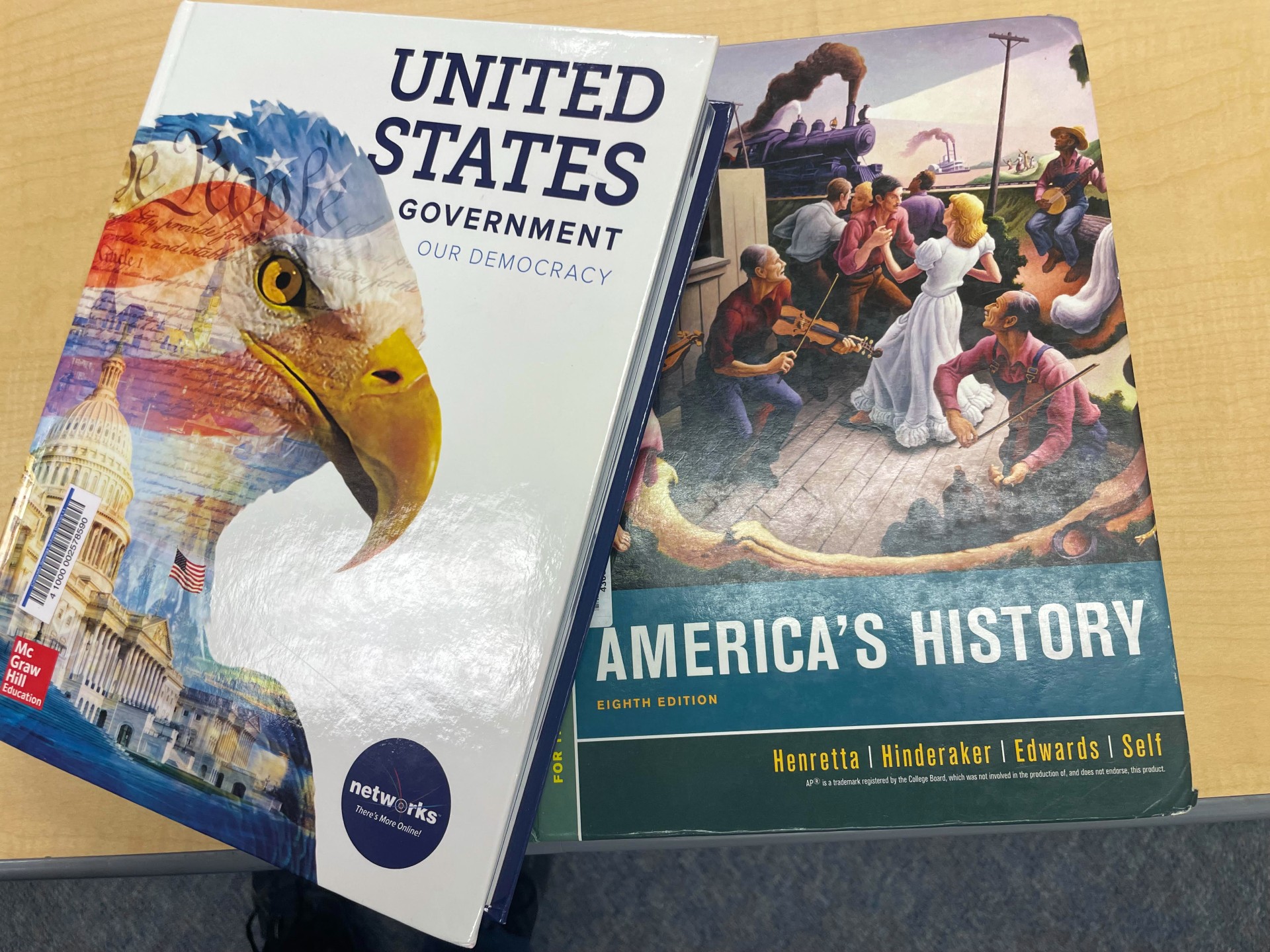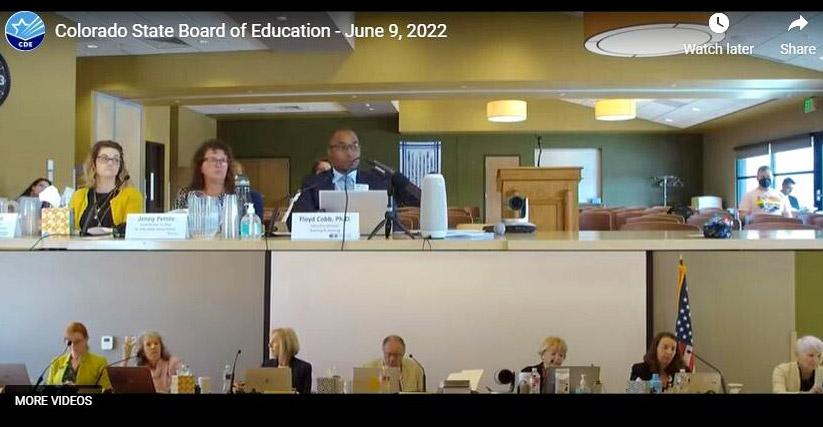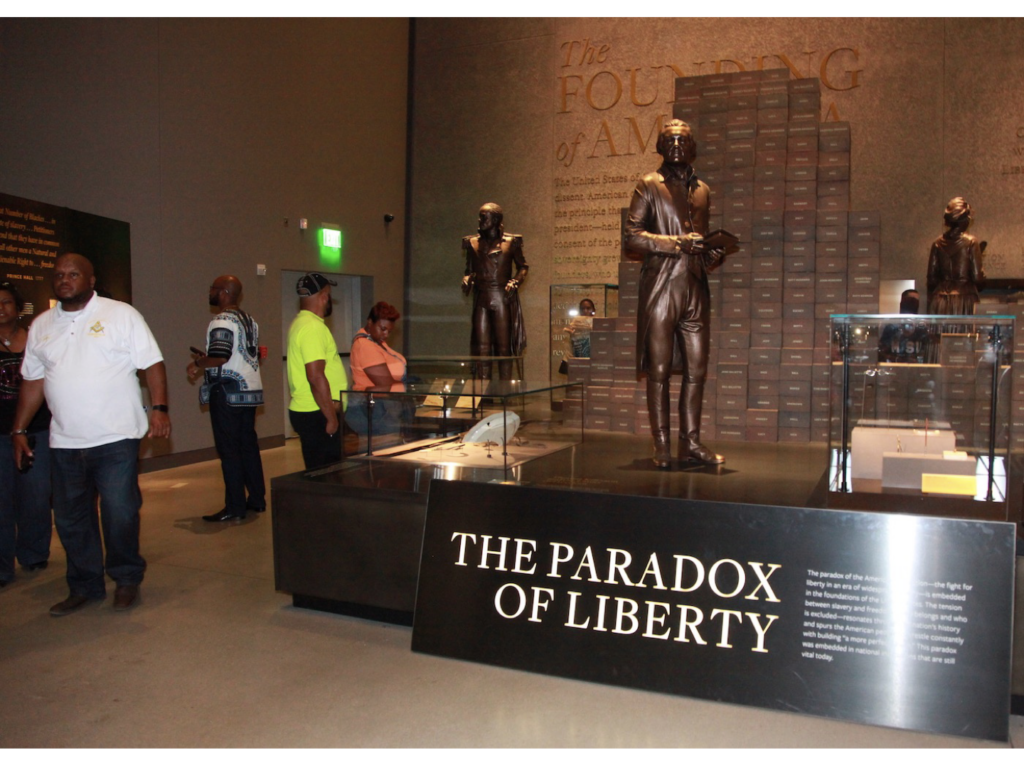
A state school board member this week plans to propose a new set of social studies standards for Colorado’s students – one crafted by a national conservative education coalition. The standards focus on Western civilization and American exceptionalism and highlight patriotism and Christianity — and have drawn sharp criticism from teachers and national social studies groups.
It’s the latest twist in the ongoing debate over what and who Colorado students should learn about in social studies as the state school board continues its process of revising the state’s social studies standards.
Board member Debora Scheffel, who is also the dean of the school of education at Colorado Christian University, will introduce the Civics Alliance’s “American Birthright” model standards as an amendment at Wednesday’s monthly state board of education meeting.
American Birthright declares that students “should be educated to be another Harry Truman,” and in the standards they’ll learn of heroes of liberty such as “Abraham Lincoln, Susan B. Anthony, Martin Luther King, Jr., and Ronald Reagan.” Critics, however, say such standards would do a disservice to Colorado students by giving them a watered-down curriculum that only tells one main narrative, ignoring the diverse tapestry of voices that make up U.S. history and civic life.
“I thought if we started with something stronger in terms of content, rigor, clarity, and organization, we could perhaps amend that document and make it Colorado’s own,” said Scheffel, who has expertise in assessment, special education, literacy and cognitive science.
She raised early concerns during the revision process that Colorado’s civics and history standards lack clarity and organization. She cited a report card issued by the conservative-learning Thomas B. Fordham Institute that gave Colorado a “D” rating for content and rigor of its civics and history standards and very low scores for clarity and organization. She said the reviews were conducted by a bipartisan team of veteran educators and subject-matter experts.
Massachusetts and Florida meanwhile, rated much higher, A- and B respectively.
The American Birthright standards draw on several sources, including the Massachusetts history and social science curriculum and the Florida social studies standards, Scheffel said.
“These standards are not perfect, but could form the basis of enhancing Colorado’s standards so they are more rich in content, more rigorous, more clear, and are better organized.”
The state board is making sure civics standards reflect a new law. The bill calls for civics standards to be based on the three branches of government and how laws are enacted, how citizens shape and influence the government, the significance of the Declaration of Independence, and how the U.S. Constitution and Colorado Constitution are amended and the significance of the state and national supreme courts.
“The American Birthright standards emphasize the history of the founding of our democratic representative republic, and the rights and responsibilities, checks and balances and liberty that are the basis of America,” Scheffel said. “The standards feature clear benchmarks in history, geography, civics, and economics for instruction.”
The Civics Alliance’s coalition, which released American Birthright last summer, includes conservative organizations like Moms for Liberty, a national group distrustful of what’s taught in public schools that have successfully led book-banning campaigns and opposed schools teaching emotional and mental health coping skills. The coalition also includes the American Heritage Education Foundation, the American Freedom Alliance and the Center for the American Way of Life.
How we got here
Every six years, Colorado updates and revises its social studies standards to reflect new state laws. Already, the board has passed revisions for certain chunks of the standards: Holocaust and genocide studies and personal and financial literacy. On Wednesday, it takes up civics and media literacy standards.
The section, however, that has caused the most controversy, is a 2019 law requiring the standards to reflect the history, culture and social contributions of specific racial and ethnic groups, as well as LGBTQ individuals. It specifically names American Indians, Latinos, African Americans, and Asian Americans, and lesbian, gay, bisexual, and transgender individuals within these minority groups, and the contributions and persecution of religious minorities.
A state-mandated commission issued a report offering a number of recommendations that included references to specific groups of people be included in lessons starting in first grade. About a third of public feedback opposed those recommendations. Some board members as well, complained there were too many references to certain groups or that some were ‘age-inappropriate.”

By June, the commission removed references to LGBTQ people below grade four – and dozens of references to minority groups were stripped from the latest revision. That prompted a public outcry as well as a letter from a group of Colorado lawmakers concerned about the revisions and “inappropriate political editorializing” from certain state board members. The state board is expected to take up the commission’s recommendations again at its November meeting.
The committee will possibly vote on all social studies standards then, or in December.
Scheffel’s proposed amendment to consider the “American Birthright” social studies standards for Colorado could intensify the discussion on civics standards this Wednesday.
What’s in the American Birthright standards?
The Civics Alliance encourages lawmakers and state school board members across the country to adopt the standards with the goal of influencing social studies curriculum. In Colorado, school districts adopt their own curriculum to conform to state standards. Civic Alliance leaders have said American Birthright is the kind of project President Trump’s now-disbanded 1776 Commission might have created.
“The warping of American social studies instruction has created a corps of activists dedicated to the overthrow of America and its freedoms, larger numbers of Americans indifferent to the steady whittling away of American liberty, and many more who are so ignorant of the past they cannot use our heritage of freedom to judge contemporary debates," the introduction reads.
American Birthright's authors accuse state education departments of imposing standards that combine “the worst of misguided pedagogical theory with the worst of anti-American animus.”
In the standards, Ronald Regan gets his own section, including his revitalization of the conservative movement and his “anticommunist” foreign and defense policies. It refers to Obama’s Affordable Care Act but also “executive amnesties for illegal aliens,” and for the Trump administration section, the “George Floyd Riots” and sharply increased political polarization are included, but no mention of the Jan. 6th insurrection.
There are 45 references to the word “religious” and 113 references to “liberty,” one reference to “Hispanic,” four references to “African American,” four references to “American Indian” and 65 references to “slave” or “slavery” in the 149-page document.

It encourages educators to “emphasize the role of faith in sustaining and extending liberty.” A section on Western civilization references the “uniquely European histories of science, technology, and free-market economics,” while a section on “World History” urges educators to examine “small-scale tribes, nomadic societies, and villages that preceded civilization, whose warlike nature must be understood in order to comprehend the character and the magnitude of the civilizing process.”
It asks educators and students to “examine how Europe created a world system that united largely separate regions and gave birth to new nations in the Americas and Australasia,” without referencing how the colonizers’ drawing of national boundaries resulted in decades of bloodshed in many parts of the world.
Critics say American Birthright narrative too narrow
Critics argue a more detailed and nuanced view of American history is more accurate and isn’t unpatriotic.
The National Council for the Social Studies said in a statement that the American Birthright standards do not align with the best practices and are “an attempt to return to a time when United States social studies classrooms presented a single narrative of U.S. and Western history that glorified selected aspects of history” and minimized the experiences, contributions and perspectives of others.
The statement goes on to read: If implemented in schools, these suggested standards would have damaging and lasting effects on the civic knowledge of students and their capacity to engage in civic reasoning and deliberation.
Elizabeth Meyer, a professor in the school of education at the University of Colorado Boulder sees “red flags left, right and center” in American Birthright.
“They are trying to roll back the advances that we have made to have a more inclusive, diverse, and critically responsive curriculum in the classroom that we know from research is more effective for more students and better helping them to be better prepared, to be fully engaged citizens in a democracy.”
She said these standards maintain a narrative of white colonial Christian men being the heroes and saviors of the nation. That ultimately damages Colorado students, she said.
“Anybody whose story does not fit into that neat package — if you're a woman, if you're a person with a disability, if you’re in an Indigenous community, if you're a person of color — your stories, your triumphs, your experiences are not centered or not valued, and you're consistently told that you don't matter,” she said.
Anton Schulzki, a history teacher in Colorado Springs and a former president of the National Council for Social Studies, said the American Birthright standards reduce the study of American history and government to “simply a laundry list of who’s who and events” without the reflection, debate, and multiplicity of viewpoints required to understand history. Nor, he said, do they incorporate aspects of sociology, psychology, anthropology and religious studies essential to social studies.
“It’s just not good pedagogy. It’s not 21st century. It's very much a 1970s approach,” Schulzki said.

Kent Willmann taught social studies for more than 30 years in the St. Vrain Valley school district and spent nearly a decade educating new social studies teachers at CU Boulder’s school of education. On a visit to the Smithsonian National Museum of American History, he recalls seeing a giant star-spangled banner made out of hundreds of mirrors.
“You see yourself and everybody else reflected in these mirrors … with any kind of history standards you should see all kinds of people reflected in them.”
What’s next?
For the civics standards, board member Joyce Rankin is proposing stripping out students analyzing the Declaration of Sentiments, a document scholars’ credit with launching the long struggle for gender equality, punctuated by the 19th amendment of 1920 guaranteeing women’s right to vote. She recommends stripping civil disobedience from the list of strategies people can use to effectively influence public policy.
Other board members say they’ll have recommendations to restore references to specific racial and ethnic groups to the original social studies standard’s revision at November’s meeting.









